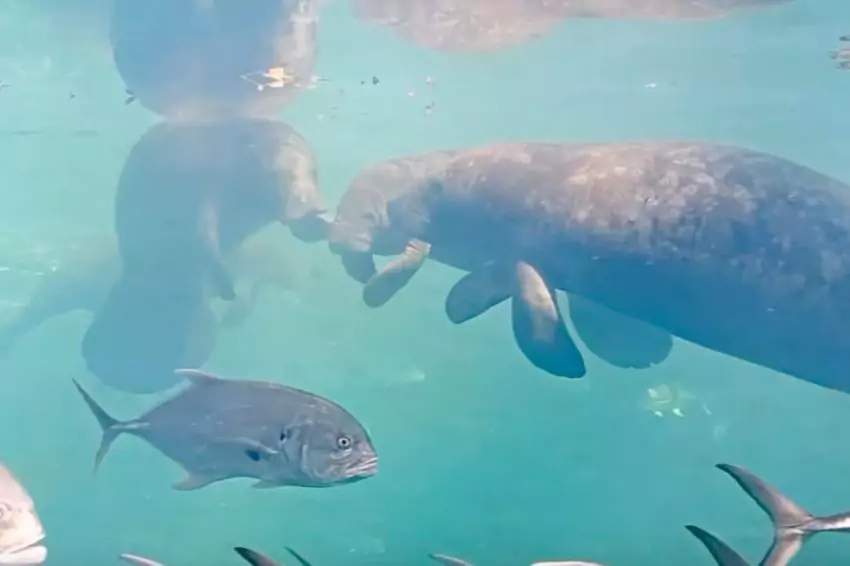Can you eat manatee? It is a question that has puzzled many people for years. While some people may find eating this gentle sea creature repulsive, others are curious about its taste.
In this article, I will explore eating manatee and provide all the necessary information.
Essence of the Article
- Manatees are protected by law in many countries, and it is illegal to eat them.
- While some people find eating manatee repulsive, others are curious about its taste.
- Manatees are herbivores and feed on aquatic plants such as seagrass and algae.
Can You Eat Manatee?
Manatee meat is indeed edible and has been consumed in some cultures. However, hunting, killing, or eating manatees in the United States is illegal.
The Legal Perspective
Manatees are protected under federal law in the United States. The Marine Mammal Protection Act (MMPA) of 1972 prohibits the hunting, killing, or eating of manatees.
Violations of the MMPA can result in fines and imprisonment. The Florida Manatee Sanctuary Act of 1978 also protects manatees in Florida waters.
The Cultural Perspective
In some cultures, manatee meat has been consumed for centuries. The indigenous people of the Amazon Basin in South America have been known to hunt and eat the Amazonian manatee.
However, it is important to note that just because something has been done for a long time does not mean it is legal or ethical.
The Nutritional Value of Manatee Meat
Manatee meat is said to taste like a cross between pork and beef. It is a lean meat that is high in protein and low in fat.
According to the Mote Marine Laboratory, manatee meat contains about 20 grams of protein per 100 grams of meat. It is also a good iron, zinc, and vitamin B12 source.
Despite its nutritional value, it is important to remember that manatees are an important part of the ecosystem and play a crucial role in maintaining the health of coastal waters and rivers.
Their grazing habits help keep seagrass beds healthy, providing habitat for other marine animals.
Overhunting and poaching of manatees can lead to their extinction and disrupt the ecosystem’s delicate balance.
What Does Manatee Taste Like?
I have always been curious about the taste of manatee meat. After researching, I found out that manatee meat is not widely consumed but has been eaten in the past.
Here is what I discovered about the taste of manatee meat:
- Manatee meat has a mild and slightly sweet taste with hints of grass and an earthy flavor.
- Some people also note that the meat has a gamey taste, depending on where it was sourced from and how it was cooked.
- The texture of manatee meat is similar to beef, pork, and veal.
- Manatee meat has a low-fat content and calories, making it a healthier alternative to beef or pork.
Eating manatee meat can have serious legal consequences and is not a sustainable food source.
Which origin of people eats manatees?

As I researched, I found that manatee meat is consumed by people in certain regions of the world, especially in parts of West and Central Africa, the Caribbean, and parts of South America.
However, it is important to note that hunting and eating manatees is illegal in many countries, including the United States.
In West and Central Africa, manatee meat is considered a delicacy. It is often served at special occasions such as weddings and funerals.
Manatee meat was once a staple food for many indigenous people in the Caribbean, and some communities still consume it.
In South America, manatee meat is also eaten in some regions, particularly in the Amazon basin.
It is worth noting that the consumption of manatee meat is controversial, and many conservationists argue that eating manatees contributes to their decline in numbers.
In addition, manatee meat can contain high levels of mercury, which can harm human health.
Manatee Habitat and Characteristics
Manatees are large aquatic mammals typically found in shallow, slow-moving rivers, estuaries, and coastal waters.
Herbivores feed on various aquatic plants, including seagrasses, freshwater vegetation, and algae.
They can consume up to 10% of their body weight in vegetation daily, meaning they spend a lot of time grazing in their habitat.
Manatees are gentle creatures and are well-known for their slow-moving nature.
They are often called “sea cows” because of their grazing habits and large, rotund bodies. They can grow up to 13 feet in length and weigh as much as 1,300 pounds.
Manatees are found in warm waters throughout the world. Still, they are most commonly found in the waters of the southeastern United States, the Caribbean, and South America.
In the United States, they are most commonly found in the waters of Florida, where state and federal laws protect them.
One of the most important aspects of manatee habitat is the presence of seagrass beds. Seagrasses are an important food source for manatees, and they also provide important habitat for a variety of other aquatic species.
In addition to seagrass beds, manatees are found in areas with freshwater aquatic vegetation, such as eelgrass and coontail.
FAQ
I came across some common questions people have.
Here are the most frequently asked questions and their answers:
Manatees are an endangered species, and hunting them for food has contributed to their decline in numbers. Additionally, manatees are slow-moving and docile animals, making them easy targets for hunters. By making it illegal to eat manatee, the government hopes to protect the species from further harm and promote their conservation.
While I have not personally tasted manatee, some people describe it as having a sweet and mild flavor, similar to pork or veal. However, it is important to note that eating manatee is illegal, and I do not condone or encourage the consumption of this protected species.
No, manatee cannot be farmed for food. They are protected under federal law, and it is illegal to harm, harass, or kill them. Additionally, manatees require a specific diet and habitat to survive, which would be difficult to replicate in a captive environment.





Leave a Reply
You must be logged in to post a comment.